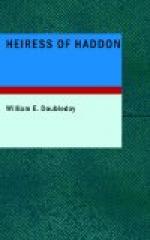The loss of the paper somewhat disconcerted Sir George Vernon, and after the disappearance of the ostler he sat for a minute or two quite dumbfounded, gazing in speechless surprise at the closed door. His companion was a man of action, however, and undaunted by finding the door locked, he hastened to the window, and would have attempted an exit there had it not been that the windows were too narrow for such a procedure.
Baffled again, but in nowise disheartened, he began to thunder at the door, and with the assistance of Sir George Vernon he soon made noise enough to attract attention.
The first to hear them was the chambermaid, and she, very naturally suspecting that thieves were in the room, ran out into the yard and intimated as much, at the top of her voice, to all the neighbours.
Meanwhile the knocking continued, and was, if anything, more vigorous than before. Startled by such an unusual din, the worthy Boniface awoke from his slumbers, and, in no very enviable frame of mind, set off, poker in hand, to summon aid. Help soon came, and, armed with pokers, brooms, and pitchforks, the door was quickly broken open and the gallant company rushed in, knocking Sir George over as they entered.
In the pause that followed the first rush the mistake was discovered, and the situation was explained. The landlord was profuse in his apologies, the more so as he caught the look of anger in the baron’s eye, but peace being quickly made, he rewarded his followers and sallied out to discover the whereabouts of his delinquent servant, breathing out dire threatenings against him. He searched in vain, and after a thorough examination, returned in ill mood to partake of the first meal of the day, and to discover the extent of his losses ere he proceeded to appear against the unfortunate Edmund Wynne.
As the baron and Sir Thomas rode together to Westminster a few hours later, it was with spirits considerably higher than they could have expected four-and-twenty hours earlier. Sir George had resumed his haughty bearing, but he was, in truth, though he would never have confessed it, more than a trifle nervous. At last the great Justice Hall was reached, and, with a parting injunction not to answer to the challenge, Sir Thomas separated from him, passing in by one door while the baron entered by another.
Sir George’s nervous temperament was severely tried upon this occasion, for he had a considerable time to wait, and he found no better plan of whiling it away than that of impatiently pacing up and down in the little room allotted to him; and he imagined himself suffering all sorts of horrible tortures.
At last his turn came. The door opened; his name was called; and composing himself as well as he was able, he stepped into the crowded hall with considerable dignity, accompanied by a pompous member of the Court, and at once became the cynosure of all eyes.
He stood impassively, casting his eyes around in search of Sir Thomas Stanley, and curious to recognise as many as he could among the motley crowd which had come to see him tried. During the time the charge was being read, and just as he had discovered his companion in the throng straight before him, he was challenged by the Clerk of the Crown to plead.




